Two Decade Old Dream Fulfilled As New Agriculture Facilities Are Dedicated

April 26, 2022
NORFOLK, Neb. – A 20-year dream to develop state-of-the art facilities for agriculture program students at Northeast Community College has become a reality.
A dedication ceremony took place for the College’s new Veterinary Technology building and nearby combination Farm Operations building and Large Animal Handling facility at the Acklie Family College Farm. The site is located near Northeast’s Chuck M. Pohlman Agriculture Complex, 2301 E. Benjamin Ave., in Norfolk.
Dr. Leah Barrett, Northeast president, said the role of the College is to support the economic development needs of its 20-county service area and assist businesses in their growth and evolvement. She said with the new Veterinary Technology building and new college farm facilities, Northeast is positioning itself to be a leader in the field.
“This is being accomplished with 13 different ag-related programs of study and 14 full-time faculty members,” Barrett said. “Recently in the Chronicle of Higher Education, agriculture was rated as the fastest growing academic major in community colleges in the United States. Having state of the art equipment and facilities, expert faculty, and a 500-acre contiguous farm, we can leverage all these assets and create a one-of-a-kind, national model for collaboration and partnership.”
The late Chuck Pohlman, the first dean of agriculture at Northeast, visioned a complex of structures for agriculture programming on the farm site east of the College’s main campus. Barrett said through Pohlman’s efforts, the ag complex that bears his name was constructed and opened to students in 2004.
“But the farm economy was not strong at that time, and donations were hard to come by,” Barrett said. “Sadly, Chuck’s dream didn’t become a reality in his lifetime; however, the dream remained vivid in the eyes of the Northeast Board of Governors and our generous donors. We are so pleased that more of what Chuck Pohlman envisioned has been built.”
The $22 million facilities include the 38,431 square foot Veterinary Technology building that features classrooms, labs, surgery suite, radiology, kennels, and exercise areas, as well as collaborative space for students and offices for faculty. The farm ops/large animal building is located north of the Pohlman Ag Complex. Other new structures are a three-sided commodities storage building, a small animal shelter, feedlots, and sorting pens. Approximately seven acres may be used as livestock pens and an outdoor classroom area.
The buildings, which replace 100-year-old farm facilities, have allowed Northeast to make plans to double the number of veterinary technology students being admitted into the program. The College will also be able to offer more hands-on applied learning opportunities for both credit and non-credit students and provide continuing education opportunities for professionals in the field.
Northeast Community College’s agriculture program has grown from just three students from its humble beginnings in 1973 to over 350 students today. In the 1980s, members of the Board of Governors, who saw the value of having a working farm that was contiguous to the campus, purchased property from the State of Nebraska that now includes farmland and the ag complex.
Julie Robinson, chair of the Northeast Board of Governors, said she and her colleagues also saw value in continuing their predecessor’s commitment to agriculture programming by committing $10 million from the capital fund to support the current work. She said she is grateful to the supporters of the College who contributed the remaining $12 million to the Nexus Campaign.
“I speak for the Board when I say thank you to our volunteers and donors,” Robinson said. “We are so proud to be able to stand up here and proudly point to these facilities as evidence of the great partnership that Northeast has with the community and the region it serves.”
Robinson also acknowledged Northeast faculty and staff for their dedication and commitment to students which she said is evident by the most recent Northeast Graduate Report. The report confirmed that 99.5% of 2021 graduates are employed or are continuing with their education, and 88% are employed in jobs related to their program.
“That success speaks for itself, and it is a demonstration of the College’s commitment to its mission which is dedicated to the success of students and the communities it serves.”
Dr. Michael Cooper, director of the veterinary technology program, interviewed for a position in the program with Pohlman in 1991 that concluded with a tour where his future boss was excited to show him a new lab area, dog kennel and surgery room in the former farm building that became inadequate over time. Cooper describes the new Veterinary Technology building as “bright, vivid and spectacular.”
“The educational experience obtained by our students will be second to none, “Cooper said. “If Chuck could see the new facilities, his glasses would slide down his nose and I can hear him say, ‘Wow!’ Thank you to the many donors and people who worked tirelessly to make this building a reality. Good things truly come to those who wait.”
Mariah Frevert, a veterinary technology student from Wayne, said the new buildings will allow students to get their education in one location as opposed to running back to different buildings across campus to get to their classes and share one large lab with many different classes.
“But now, we are incredibly lucky to have these amazing new buildings that allow all of our classes, teachers, and classmates to be under one roof,” Frevert said. “Not only will they benefit veterinary technology students they will also benefit students in all agricultural fields. Our new state-of-the-art facilities have put us at the forefront of innovation and advancement in veterinary medicine and agricultural sciences.”
Tracy Kruse, a first-year veterinary technology student from Yankton, So. Dak., thanked the donors and the Board of Governors in providing funding for the new College farm. She feels fortunate to be among the first students to be able to train and earn a degree in such modern facilities.
“The new (Veterinary Technology) building allows me and my fellow classmates to have access to some of the greatest technology known to veterinary science and gives us the opportunity to work in a high-quality environment,” Kruse said. “The labs and classrooms are state-of-the-art and we are able to learn and practice our skills in an area that has plenty of space for each student and first-class equipment that all of us are encouraged to use.”
Additionally, the new spaces will allow College’s agriculture programs to continue to improve and expand the quality of instruction. Tara Smydra, dean of science, technology, agriculture, and math, cited a meeting of the Veterinary Technology program’s Advisory Committee, made up of professionals in the industry and faculty, where a discussion took place on how to fully utilize the new building.
“The excitement they had and the creative thoughts, innovative ideas and planning that is happening simply from having spaces that allow us to do more for the community and students is wonderful. It is obvious that our community members appreciate and value what we do at Northeast, and we can’t wait to do more to serve our community and our students,” Smydra said.
More than 20% of the funding for the Nexus Campaign came from the family of Phyllis and the late Duane Acklie through the Acklie Charitable Foundation. Both are natives of Madison County and alumni of Norfolk Junior College, one of the institutions that merged to become Northeast Community College. They went on to establish Crete Carrier Corp., which has grown into a transporter of virtually any product and operates more than 5,000 tractors and over 13,000 trailers throughout the continental United States.
Halley Acklie Kruse was joined at Tuesday’s celebration with her grandmother, Phyllis Acklie, and other family members. Speaking on behalf of the family, Acklie Kruse commended Northeast Community College for its efforts to successfully established the Nexus Campaign and bring the project to where it is today.
“Reaching a goal like this does not happen without incredible effort and teamwork.”
She said the strength of the project’s vision was put into sharp focus over the past two-years and demonstrated the need for all industries to innovate.
“And that is why I think the Nexus Campaign has resonated with businesses, individuals and the broader community because investing in what is next for sustainable agriculture, next for Nebraska’s workforce and next for innovation is necessary for students, future farmers and ranchers to have the problem-solving skills needed to meet the demands of the future,” Acklie Kruse said. “Thank you to everyone who played a part in bringing this vision to life.”
